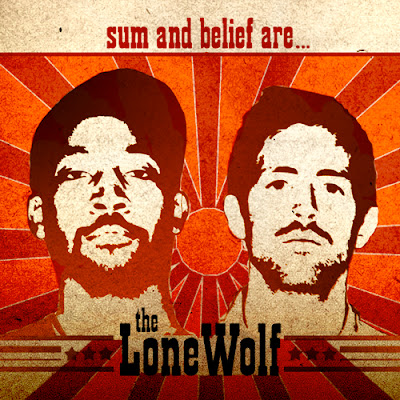
The Lone Wolf
Sum and Belief
by Sidik Fofana
Sum and Belief
by Sidik Fofana
I guess “flow” is the right word for it. However, Sum’s impressive rhyming is—if one is searching for a more apt analogy—like surfing. Some MC’s can surf the wave of the beat a half-a-bar or a full bar before having to breathe or break up the continuity with an abrupt phrase. This is not Sum’s style. His producer, the LA bred Belief makes the background a melodious vessel and Sum does what he knows: rides it to the fullest extent. Thus, the two put their heads together for the cogent The Lone Wolf , which bundles well-tailored lyrics into a concise half-an-hour of music.
Sum sounds like what you would get if you forced Jesse James to tell his life story on Def Poetry Jam. There’s definitely something cowboyish about this album—the lingering acoustic guitar notes and the harkening harmonicas over Hip-Hop beat breaks—that beckon the Wild West. The sound, along with Sum’s damn-near elegiac storytelling, gives The Lone Wolf a certain type of ghostly mystique that’s unfamiliar to Hip-Hop. This distinguished vibe presents itself in songs like, “Breakfast on the Moon,” a speculative ballad that’s one part science fiction and two parts slave narrative. All the while, Sum’s breathless rhythmic delivery continuously pops up during the LP begging for praise. In “35 Cents,” he uses his nimble tongue and squeezes the line, “Evaporated pieces of a story that you can’t encapsulate and carry with you when you lonely,” effortlessly into one bar.
The Lone Wolf is more a conceptual album than a musical one. It’s the type of release one appreciates and not necessarily dances to. Catchy hooks take a backseat to well-crafted lyrics (see “Next September”). Sum and Belief have concocted an opus that sounds dope on speakers and even doper on paper as poetry. Whether this music stands the test of time, depends on which definition of “music” applies.

No comments:
Post a Comment